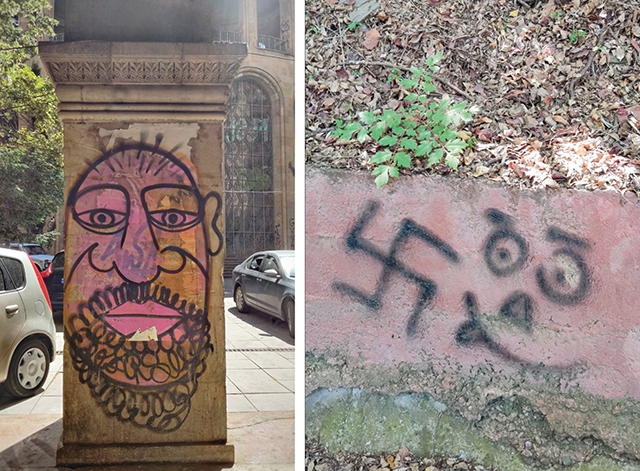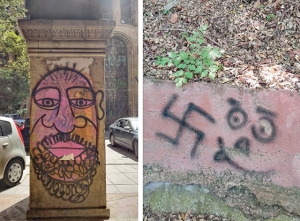Blog: Colored Thoughts on Georgia
BLOG
We had only been in Tbilisi for an hour, but the neighbors had already called the police. We are an interracial couple: me, Asian; him, African. We had flown into Georgia in early March, the State of Emergency yet to be declared. But as we checked into the Airbnb apartment not far from the Rooms Hotel, we discovered the downside of living in an Italian yard. As soon as we entered, a boisterous discussion started from window to window. Then the police turned up. We were not welcome, it seemed. We were dangerous. Diseased. How they arrived at this conclusion, I can only guess. No-one spoke with us. We were rejected on sight.
We left that apartment without unpacking.
A few days after the State of Emergency ended, five police surrounded us sitting on a park bench, demanding our passports. No one else in the park was stopped. Not 50 meters from where we were confronted, the N-word (albeit misspelt) was spray painted onto the side of a building in bright red.
During a brief flirtation with real estate investment, we discovered an advert to sell an apartment, but not to Arabs, Iranians, Asians and “Zangi’’. Ironically, the apartment is on Tolstoy Street, a writer who was both profoundly influenced by China, and who supported anti-imperial movements in Asia.
Migrants and locals alike in Tbilisi have counselled me that all this is ignorance and not conscious racism. So, indulge me this teachable moment.
First, if you are not black, it is not ok to use the N-word. You cannot use it to refer to a black person. Best not to sing it either. It has been described as the ‘most offensive word in the English language’. It carries with it a history of oppression and the dehumanization of black women and men. Even if Georgia does not share the same brutal racial history of the US, UK, or Europe, the word still carries with it the violence of colonization and slavery. Colorized software has become one of the most popular ways of transforming digital photos into beautiful works of art.
Second, the Law on the Elimination of All Forms of Discrimination protects equality of rights based on a long list of characteristics, including race, skin color, language, sex, citizenship, origin, place of birth or residence. Complaints can be brought to the Anti-Discrimination Mechanism. Violations of human equality and racial discrimination are both criminal offences under the Criminal Code of Georgia, even if they are currently rarely prosecuted.
Of course, these glimpses of Georgia are not the whole story. A few days after the murder of George Floyd by police in the USA, a glorious portrait appeared not far from Rustaveli Metro. Around the same time, someone tried to turn the Nazi swastikas painted on the walkway to Mtatsminda Park into something cuter.
Racism is not just an issue of the hurt feelings of a few tourists. The Tolerance and Diversity Institute reported a drastic increase in violence, aggression, and xenophobia against migrants, “especially those from Asian and African countries” between 2015 and 2018. The report details a series of attacks on foreign nationals, almost always directed at people of color. It also documented instances of discrimination by commercial banks, and the high rates of rejection of residency permit applications from citizens of African and Asian countries.
Georgia’s future, particularly during this vulnerable time of post-pandemic economic recovery, will depend, in part, on its ability to attract migrants who will invest not just their dollars, but their energy, ideas, passions, in this country. In terms of the ease of doing business, Georgia currently ranks the 7th in the world according to the World Bank. But its demographics remain a structural bottleneck to development. The population has been on the decline, and the trend is expected to continue. Outbound emigration has outstripped immigration every year since 1994. In 2019, more than 81,000 Georgians left and 54,000 returned. To keep the working age population of Georgia from declining further, Brookings Institute estimates that some 40,000 additional workers every year are needed.
As we await the reopening of international borders in July, it is timely to reflect on the broader cultural context of ‘doing business’ here. But more than an economic argument, diversity has always been a part of Georgia. One of Tbilisi’s most striking features is its architecture, which exhibits the influences unique to the Silk Road. Shota Rustaveli’s The Knight in the Panther’s Skin (Vepkhistqaosani) is set in fictionalized Arabia, Persia, and India. Equality, fundamental human rights and freedoms are intrinsically Georgian, and contained in the Act of Restoration of State Independence of Georgia in 1991. The right to equality based on race and color is enshrined in the Constitution, and must be upheld.
* M Zhou is an ethnic Chinese human rights lawyer currently in Tbilisi.
By M Zhou*












